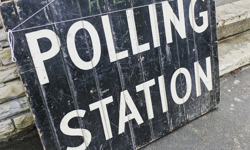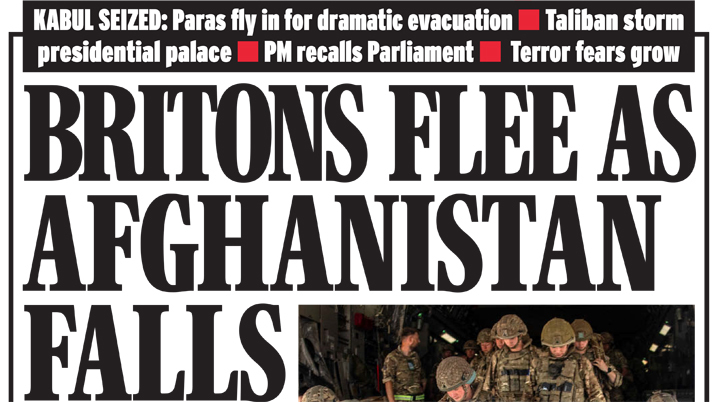
Kabul chaos – years in the making
Should we stay or should we go? If we go there will be trouble, And if we stay it will be double.
The Clash knew what they were singing about – almost two decades before the West ventured into Afghanistan. Once we were there, there could be no good decision about whether and when to leave.
Even newspapers with firm views about just about everything else can’t make up their minds whether we should be pulling out – although all sides are united in condemning the way the withdrawal is taking place.
This provides a useful stick for pro-Republicans to beat Joe Biden, conveniently forgetting that he is implementing an agreement forged by the Republican Trump (and that it was the Republican Bush Junior who invaded in the first place).
The traumatic scenes at and around Kabul airport and the race against time to rescue people are in many ways similar to disasters that have afflicted countries all over the world – the earthquake in Haiti, the war in Syria, the famines of Africa – which are usually confined to the foreign pages. But here we are having to confront both our own responsibility for helping to create the situation and our impotence in influencing its outcome. And, of course, there are Brits in there desperate to come home.
These elements have forced the story onto the front pages and kept it there, with new angles surfacing with every passing hour: the Raab holiday, Johnson’s pleading with Biden, the airlift, the fears for people – and even zoo animals – left behind. And then there were the individual horror stories, notably the deaths of a man falling from a plane in Kabul and a refugee child falling from a balcony in Sheffield.
For the past week, whatever their editorial view on Biden’s decision to withdraw American forces, our national papers have played a good game of catch-up. Even the Express, which is not known for its overseas news coverage, has splashed on Afghanistan on eight of its last ten issues. OK, that might be a bit generous, since they have all been firmly rooted in Britain – from “Time running out for trapped Britons” to “Boris: airlifts will go down to the last moment”. Even in this time of tail-turning tragedy, we Brits are front and centre of the universe.
For others, the big question has been – as the Mail put it – “What the hell did they all die for?” And as fast as military and political types have been reassuring bereaved families that they should be proud, that their lost loved ones had been doing their duty, so commentators have been saying in so many words that it was all for naught.
In the Times, Matthew Parris has been nothing if not consistent. In March last year, the weekend after Trump signed his deal with the Taliban, Parris wrote a column headlined “Our Afghanistan heroes died for nothing” in which he argued that the mission was always destined to fail. Last Saturday, he was back making the same point, this time under the heading “The sad truth is our Afghan fallen died in vain”. His war correspondent colleague Anthony Loyd reached the same conclusion in February, but coming from a different direction. Parris is in favour of withdrawal; Loyd was appalled by Trump’s Doha deal, saying it would hand Afghanistan to the Taliban, “giving away everything we fought for”.
Even the Express, which is not known for its overseas news coverage, has splashed on Afghanistan on eight of its last ten issues.
Who to blame
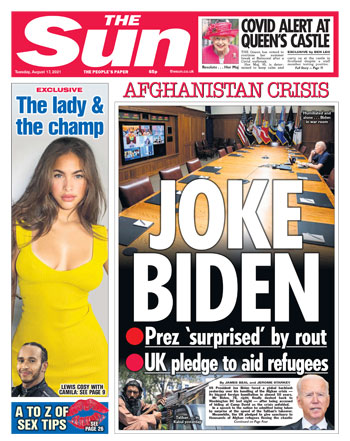
Back at the Express there have been similar divergences and convergences. Leo McKinstrey has written of “Blair’s deluded folly”, of an “experiment that was always doomed”, that “we can’t be the world’s policeman”; while for Ross Clark, “Biden’s error” had created a “dangerous vacuum”; for Stephen Pollard, it was a “shameful cut and run”; for Nick Ferrari, the withdrawal was the action of a “cowardly pound-shop President”. That latter was referring to the man who actually put the deal into effect, not the one who signed it.
The News UK dailies also rounded on the present White House incumbent: for the Sun, he was “Joke Biden”, while the Times splash told readers “MPs condemn Biden over ‘shameful’ US withdrawal”. That was an interesting one. The photograph at the top of the page was of Raab, Johnson and Defence Secretary Ben Wallace on the Government front bench after Parliament had been recalled for an emergency debate. Others, of all political leanings, who witnessed the occasion highlighted the fact that MP after MP had stood up to criticise the Prime Minister and his Foreign Secretary for their handling of the situation. But with two headlines to work with, The Times had no room to note these barbs, instead it focused solely on Biden, with a sub-head saying, “Cabinet ministers join attack as packed house debates chaos in Afghanistan”. Was this a political decision or a wanton waste of space?
Withdrawal started in Doha
To be fair, the Times had questioned the Doha agreement when it was signed last year, publishing a leader urging Trump not to rush for the exit. It pointed to the dangers of the Taliban returning to full power – not least in respect to the education of girls and the employment of women – and warned of the risks of a resurgence of terrorism, concluding: “Mr Trump has long blamed President Obama and his rushed withdrawal from Iraq in 2011 for the rise of the jihadists. He should beware of making similar mistakes.”
The Sun, meanwhile, gave the Doha deal just 20 words: “The Taliban signed a peace deal with the US yesterday – bringing to an end 18 years of bloodshed in Afghanistan.” Apart from being patently untrue – the signing of the deal did not, would not, could not end the bloodshed – it completely failed to offer any reason for readers to be remotely interested. No explanation even of what that meant for British troops and their families. This was a quite extraordinary omission for the paper that purports to be the “official” supporter of “our boys” and which does have an honourable link to the “Help for heroes” campaign. Soldiers and their families read the Sun; they deserved better.
And once the (delayed) pull-out began last month, how much coverage did it get? As the Taliban started taking cities in the north, as government forces capitulated, how interested were our newspapers? Hardly at all. In the two weeks of the Taliban storming through the country until they finally took Kabul, only three dailies featured Afghanistan on their front pages at all: the Times, the FT and the Sun – to report that British jihadis were joining the Taliban.
Which is what I meant earlier when I said they’d been playing catch-up.
But what about us
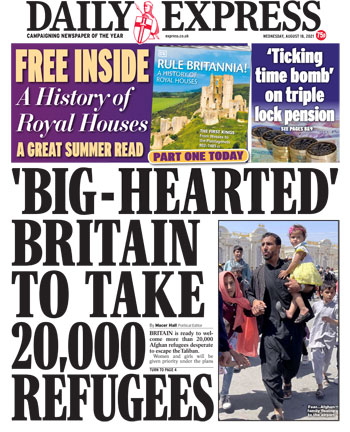
The fall of Afghanistan has led to an outbreak of “Me, me, me”.
Initially, of course, it was all about us – the Brits, that is – and not the Afghans left feeling abandoned and betrayed. Hence that first Express splash “Fears for trapped Britons” and the Mirror’s “Paras in to save 6,000 Brits”.
Then there was our “big-heartedness” (™ Dominic Raab) in offering Afghans sanctuary, with “Big-hearted Britain to take 20,000 refugees” from the Express, “UK to admit 20,000 Afghans” in the Times and “UK to take 20,000 refugees fleeing the Taliban regime” in the Guardian. Well, up to a point, Lord Copper. The whole thrust of coverage over the past fortnight has been that speed is of the essence, that urgent action is required, so readers might be forgiven for thinking that these Afghans might be turning up quite soon. Think again. “Up to 5,000” might arrive “within the next year” and a maximum of 20,000 might be allowed in while the scheme is in operation – over the next five years.
Perhaps not quite so big-hearted after all.
There was a little bit of “Me, me, me” from George Monbiot in the Guardian yesterday, too. He took the opportunity to focus on the media’s role in creating the current chaos. “Cheerleading for the war in Afghanistan was almost universal and dissent was treated as intolerable,” he wrote. “After the Northern Alliance stormed into Kabul, torturing and castrating its prisoners, raping women and children, the Telegraph urged us to ‘just rejoice, rejoice’, while the Sun ran a two-page editorial titled ‘Shame of the traitors: wrong, wrong, wrong – the fools who said Allies faced disaster’.”
Journalists and public figures who dissented were, he continued, added to the Telegraph’s daily list of “Osama bin Laden’s useful idiots” and subsequently “mocked, vilified and de-platformed everywhere”.
Monbiot doesn’t say as much in his essay on why the media always support rather than question wars prosecuted by their homeland, but a quick check of the Telegraph archive confirms that he was indeed added to the “useful idiots” list back in 2001, and mentioned rather more frequently than a hack from a rival paper generally warrants. If revenge is a dish best served cold, Monbiot must have got his Tuesday supper from the bottom of his chest freezer.
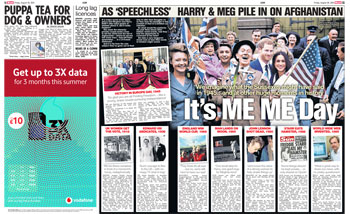
Monbiot is, however, clearly a rank amateur in a world of “Me, me, me” professionals – he doesn’t even mention himself, a rookie error. Most of us know that there are two undisputed champions – and at least two newspapers ever willing to document their performances. “Harry and Meghan: We’re speechless at the plight of the world…so now here’s our statement about it” as the Mail put it, while the Sun lost a “me” when it piled in two days later with a fantasy “It’s ME ME day” spread on what the Sussexes might have said about other world events.
The couple had put out a statement on their website, giving their thoughts on Afghanistan, Haiti and the pandemic, and calling for international co-operation. They don’t seem particularly worldly wise sentiments, but they do list organisations that they urge people to support. The intention seems to be to direct attention to practical efforts to help those at risk.
That they would be mocked was inevitable. But if there is one issue on which I’d like to hear Harry speak out, it’s Afghanistan. He is obviously constrained in what he dare say, but silence would have been bizarre. Even his harshest Press critics must realise that.
If revenge is a dish best served cold, Monbiot must have got his Tuesday supper from the bottom of his chest freezer.
Plymouth murders
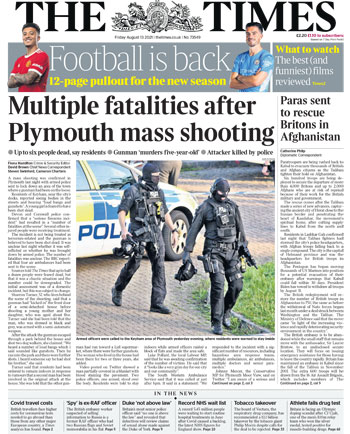
It seems like forever ago now, but the Plymouth murders exposed a series of potholes that unwary journalists can too easily tumble into.
The Times splash headline “Multiple fatalities after Plymouth mass shooting” could have come straight from a police notebook. No one in the real world talks about “fatalities”, let alone “multiple fatalities”. OK, at that stage it wasn’t known if there were five or six victims. But it wouldn’t have been wrong to go with five. The Mail gambled and was proved right on the numbers, but more than that, it got the human story across far better with “Six shot dead in Plymouth gun horror”. These sorts of headlines write themselves. How could the Thunderer have got it so wrong?
The Express looked uncaring in making the story a puff above an “Only way is up” splash about the economy and the death of Una Stubbs. The Star was even worse with its “For your pies only” splash on the “short, fat baldie” the Russians think is a British spy, with ‘5 dead in gun horror’ relegated to the bottom left corner. Caught on the wrong foot or just wrong-headed? Well, the Star managed to change up to ‘6 dead in gun horror’ for the second edition, but didn’t promote the story on the page, let alone switch it to the splash. So I think that goes down as wrong-headed.
By day two, every paper had time to get to grips with the story, particularly the returned gun licence line. Everyone splashed on it, apart from the Star – which stuck with its bottom-left treatment, this time a picture of the little girl killed out walking with her dad – and the i, with a weird something’s-not-going-to-happen story headlined “Working from home unlikely to become a legal right”. It didn’t even have the killings on a front page that covered nine different subjects. That’s just crazy.
Unusually, the Mail’s main heading – “Police gave killer virgin his gun back” – was a bit confusing. I wondered if this meant he was a virgin at murdering, but, no, it meant he was a virgin at sex. How was that relevant? The Telegraph was clearer with its “Incel killer was given back his gun licence last month”. If you knew what an “incel” was. So this was problematic in another way.
Headline writers shun quote marks with good reason. They are ugly and if you allow them, they suddenly litter the entire paper. But to use “incel” without them indicates that you accept the word and its connotations. And I’m not sure most people do. I am sure that those who do understand it know that people who call themselves “incels” blame women for all that is wrong with their lives. And so the lack of quotes in such a prominent position – the first word of a splash about a murderer – gives that philosophy an unwarranted legitimacy.
After the Christchurch massacre in New Zealand, Prime Minister Jacinda Ardern refused to utter the name of the killer. She put all the focus on his victims. Our newspapers have yet fully to embrace that lesson, but they are learning. The Mail gave equal prominence to photographs of the Plymouth killer and two of his victims. Each of the other papers that put the story on the front used victims’ pictures as the main image. But everyone but the Guardian ran at least a drop-in shot of the gunman. We are all desperate to know what such people look like. It’s human nature. But it doesn’t really add to our knowledge. It does give the killer the attention he craves – if only from the grave – and, as such, acts as an incentive rather than a deterrent to others down the line.
We still have a way to go.
The lack of quotes in such a prominent position – the first word of a splash about a murderer – gives that philosophy an unwarranted legitimacy.
Impartiality – past and present
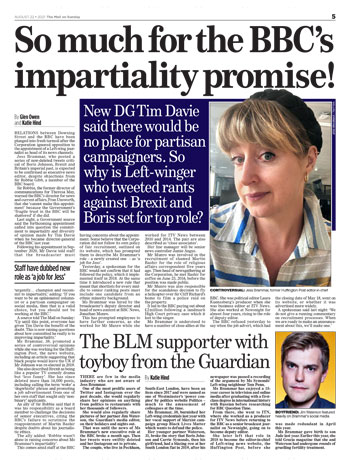
Target journalism is an ugly thing. And this week saw one of the ugliest examples. The Mail on Sunday got its claws into Jess Brammar, the former HuffPo journalist in line to become the BBC’s executive news editor. “So much for the BBC’s impartiality promise!” screamed the headline on its page 5 hatchet job, complemented by the sub-head: “New DG Tim Davie said there would be no place for partisan campaigners. So why is Left-winger who tweeted rants against Brexit and Boris set for top role?”
Brammar is apparently unsuited to the job because she has in the past expressed opinions that do not chime with those of the MoS, the Government or its supporters. She has deleted lots of tweets, but probably still holds the same opinions.
What Davie actually said, as quoted in the piece, was, “If you want to be an opinionated columnist or a partisan campaigner on social media, then that’s a valid choice, but you should not be working at the BBC.” He did not say that you should never have expressed opinions or campaigned in the past. Because if that were the case, how could Nick Robinson, once head of his university’s Conservative Association, or Amol Rajan, who campaigned for the Tories during the 2015 general election, still be employed by the Corporation? (Though it might explain why Sarah Sands, who as editor of the Evening Standard campaigned for Boris Johnson as mayor of London, is no longer editor of the Today programme.)
Professional journalists are not required not to have political sympathies, left or right. They are required to set them aside if they are to do their jobs effectively.
The principal complainant about the Brammar appointment has been Robbie Gibb, Theresa May’s former director of communications, who was appointed to the BBC Board (and knighted) by the present Government. He, according to the MoS, has told the BBC’s head of news that she cannot give Brammar the job because “the Government’s fragile trust in the BBC will be shattered” if she does. It has been pointed out elsewhere that it is not Sir Robbie’s place to get involved in editorial appointments.
Now a “government source” has told the MoS that the whole thing calls into question Davie’s pledges on impartiality and a warning shot is fired across his bows with the heavily laden “Up until now everyone’s given him the benefit of the doubt”.
The whole story is full of anonymous animus, but the sidebar is even more poisonous. Headlined “The BLM supporter with a toyboy from the Guardian”, it talks about her “burnishing her left-wing credentials”, tars the entire BLM movement as Marxist and anti-police, and makes the point that it was Waterson who broke the story about the Johnson-Symonds row that led to police being called to their flat. All of which obviously proves she can’t be trusted to treat the Prime Minister impartially.
In the past, the profile also tells us, she had posted lots of pictures of her family on Instagram, but has now restricted access – which must be infuriating if you’re a journalist looking for ammunition. Still, we know that Waterson is 31 – about seven or eight years younger than Brammar, so that must count as being a toyboy. Because branding her a cougar would presumably be too flattering? Either is wrong, of course. They’re just a couple with a slight age gap.
Returning to the Mail on Sunday’s interpretation of Davie’s stricture that if you want to campaign, you shouldn’t be working for the BBC, it might be worth mentioning that, apart from Robbie Gibb’s connections to Downing Street, the corporation’s new chairman Richard Sharp has worked for both Boris Johnson and Rishi Sunak. Oh yes, and Davie himself was once deputy chairman of the Hammersmith and Fulham Tory party and stood as a Conservative candidate for the local council.
Maybe that’s why people in high places are questioning his commitment to impartiality?
The whole story is full of anonymous animus, but the sidebar is even more poisonous.
Tributes to Charlie Watts
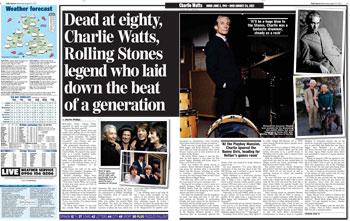
It’s not hard to envisage how the media would respond if Mick Jagger died. He would be at the top of every news bulletin and the central feature of every front page.
When I learnt on Tuesday that Charlie Watts was dead, I tuned into the radio news, expecting him to be the lead. But, no. First Kabul, then Covid, then something else, then something else. And finally, in the payoff slot traditionally accorded celebrity deaths, came the “tributes were paid to…” Maybe it was a bit much to expect the lead, but surely it was more newsworthy than the latest Covid stats. I thought the BBC had misjudged the interest in playing by the “usual” rules.
To my mind, the papers did better. The Stones drummer was the splash for all three redtops, the puff for the whitetops and the Telegraph, and the main picture for the Times and Guardian. Respected music writers were called out of their comfort zones and on to the news pages, in some cases to provide the main story. Watts’s importance to the band was put in context; he wasn’t just any drummer. (Nor, indeed was he “my drummer” as a bruised Mick Jagger learnt in an oft-repeated anecdote.) The heavies – the FT excepted – all gave him at least one news page plus a proper obit; the tabs all produced a spread, the Mail surpassing expectations with two. Only the i trotted out the “Tributes poured in” intro followed by a list of sad famous people uttering platitudes. Elton John and Paul McCartney featured everywhere else, too, but in their place, not as main-event emoters.
The Express impressed with its decision to give Watts the prime 2-3 spread. As you might expect, given that its readers are of the age that most appreciate the Stones. But this was a rare and welcome recognition that sixty- and seventy-somethings are not relics of the Second World War (which ended before most of them were born) obsessed with pensions, house prices and dementia treatments, but were actually teenagers during the most exciting time in pop music history. They’ll have bought the albums (when they were called LPs) and been to the gigs.
There were what might be construed as slight mis-steps: the Times’s main picture on both front and inside news page was of the band rather than just Watts – but he was in the foreground. Did they think people wouldn’t know who he was without the others around him?
The Mail, seemingly incapable of announcing someone’s death without simultaneously passing judgment on their life through their marital relationships, couldn’t help itself. Cynthia Lennon’s death came with the headline: “Dead at 75, wife Lennon treated so cruelly”; Robert Hardy’s with “Brilliant at everything except marriage, Robert Hardy dies at 91”. In this case, the paper bade “Farewell to Charlie, the reluctant Stone loyal to one woman”.
Charlie and Shirley Watts had been married for 58 years; a point noted by every paper. But only one thought it the key point in an extraordinary life.
Respected music writers were called out of their comfort zones and on to the news pages.
First name terms
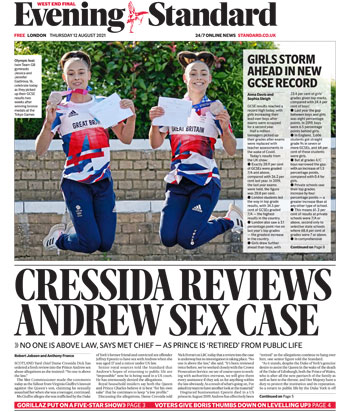
I have long had a problem with Boris (and have written as much for InPublishing). I know everyone knows who “Boris” is; I know the Maggie precedent. But I do not wish to be on first-name terms with the Prime Minister – or, indeed, the Chancellor or the Health Secretary. Now I have a problem with Cressida too. Not the one who was once Prince Harry’s girlfriend, but the one supposed to be running our biggest police force.
The Evening Standard splash “Cressida reviews Andrew sex case” jarred. This was familiarity taken too far. Not least because a fair chunk of the readership won’t have known who this Cressida was. I can see that the Commissioner’s surname might have been problematic in this instance, but some variation on Met or Yard chief could have been made to work.
Then there was the picture on the same page. Oh no, not the GCSE results day jumping girls cliché! Well yes, but no… in this case the comely teenagers celebrating their success (the exact nature of which was undivulged) in traditional tab style were medal-winning Olympic gymnasts Jessica and Jennifer Gadirova.
Forgiven.
Oh no, not the GCSE results day jumping girls cliché! Well yes, but no…
Ooops…
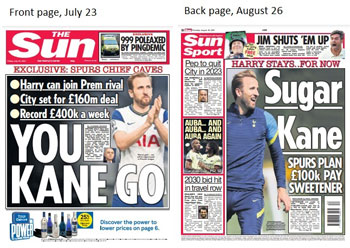
We all make mistakes; not all our predictions come true. But you really should be ultra-sure before splashing on speculation, before turning a totally feasible and brush-offable back page story into an out-on-a-limb front page lead that can come back to haunt you. This one started to unravel on the day of publication last month. It’s been quite the saga, leading to the denouement yesterday. Or at least the “for now” denouement. Kane may yet end up at City. But this is a salutary lesson in not jumping the gun.
Liz Gerard’s Notebook is a fortnightly column published in the InPubWeekly newsletter. To be added to the mailing list, enter your email address here.









